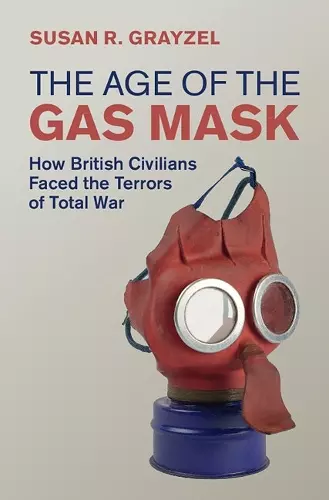The Age of the Gas Mask
How British Civilians Faced the Terrors of Total War
Format:Hardback
Publisher:Cambridge University Press
Published:11th Aug '22
Should be back in stock very soon

Uncovers how a material object – the civilian gas mask – can reveal the power and limits of the modern state facing total war.
This vivid and accessible history of the civilian gas mask from the years 1915–1945 reveals the shocking consequences of modern, total war and how ordinary civilians learned to face its terrors. It demonstrates the profound impact of new technologies of warfare on imperial Britain's culture, politics, and society.The First World War introduced the widespread use of lethal chemical weapons. In its aftermath, the British government, like that of many states, had to prepare civilians to confront such weapons in a future war. Over the course of the interwar period, it developed individual anti-gas protection as a cornerstone of civil defence. Susan R. Grayzel traces the fascinating history of one object – the civilian gas mask – through the years 1915–1945 and, in so doing, reveals the reach of modern, total war and the limits of the state trying to safeguard civilian life in an extensive empire. Drawing on records from Britain's Colonial, Foreign, War and Home Offices and other archives alongside newspapers, journals, personal accounts and cultural sources, she connects the histories of the First and Second World Wars, combatants and civilians, men and women, metropole and colony, illuminating how new technologies of warfare shaped culture, politics, and society.
'Grayzel's book is a compelling account of the social life of gas masks. She tells the history of war through one object – the gas mask – highlighting the tsunami of emotions it incites, the intensity of people's imagination, and their terror in the face of bodily violence. It is a book guaranteed to destroy any complacency about the inhumanity of war.' Joanna Bourke, author of Wounding the World: How Military Violence and War-Play Invade our Lives
'This book encourages us to think about the idea of total war in the 20th century in new and surprising ways, through the lens of material culture, and the 'weaponisation of the air'. Grayzel illuminates novel ways of thinking about the relationship between individual citizens and states, and the way that war permeated all aspects of life, for both men and women. Britain, and its empire, appear as fresh sites for understanding total war. I expect this will be a landmark book for the social and cultural history of the First and Second World Wars.' Yasmin Khan, author of The Raj at War: a People's History of India's Second World War
'One of the most horrifying strategies of twentieth-century warfare involved poisoning the air. Grayzel's meticulous study of popular and political responses to this awful prospect opens out the meanings and the legacies of efforts to protect the civilian body and offers new ways of understanding modern war.' Penny Summerfield, author of Contesting Home Defence: Men, Women and the Home Guard in the Second World War
'Grayzel's impressive archival collection reveals the value of tracing one technological object as it moved from the battlefield onto civilian bodies and eventually into the minds of an entire generation.' Peter Thompson, Technology and Culture
'This book is not just a story about an object. It tells a deeper, more significant, story about the emergence of 'civil defence' and the national security state, the projection and exercise of power, and the changing character of modern warfare. … This is a methodologically innovative project and presents something relatively new to the history of warfare. Usefully, the practically minded epilogue presents a model for future work, and one is left wondering what other objects could be used to illuminate modern conflict still further.' Alex Mayhew, War in History
'Reading this book has made me reflect on the intrusive reach of the state into the private lives of its citizens at a time of national emergency, and the lengths to which governments in the not-too-distant past were able - and willing - to go to assure and support their citizens.' Michael Roper, First World War Studies
ISBN: 9781108491273
Dimensions: 235mm x 159mm x 20mm
Weight: 550g
288 pages